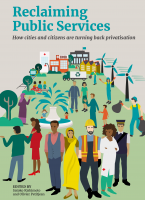The unstoppable rise of remunicipalisation Interview with Satoko Kishimoto on reclaiming public services
Temas
The debate on alternatives to privatised ownership models for public services is back on the academic and political agenda. What's driving remuncipalisation and why is it a better alternative than private provision?

One new contribution to the discussion is the report “Reclaiming Public Services: How cities and citizens are turning back privatisation,” which draws on an impressive body of “remunicipalisation” cases from various economic sectors and countries. The report demonstrates how such changes reduce costs, improve working conditions and service quality, as well as increase accountability. We spoke with Satoko Kishimoto, coordinator of the Public Alternative Project at the Transnational Institute, who, together with Olivier Petitjean, co-edited the Reclaiming Public Services report.
What is new about remunicipalisation?
For the past 30 years, we have been told that market is the only solution. Expanding the domain of the market was supposed to bring innovation, more investment and lower costs. After the financial crisis, privatisation pressures intensified in a climate of austerity that pushed governments to reduce debt, even as they spent money to save banks. But workers and citizens are starting to understand that privatisation does not deliver on its promises. People have had enough. Popular movements are looking for public alternatives that are more democratic and accountable, as well as more effective at responding to social, environmental and climate challenges.
How does remunicipalisation differ from nationalisation?
Returning privatised services to the public sector can also occur at the initiative of central governments, but such nationalisations can come with ulterior motives. Though many re-nationalisations in Latin America had very clear social objectives, for instance to make services available and affordable for the entire population, other cases also served less noble goals.
Nuclear energy provision in Japan is a good example of a government stepping in to temporarily fix private sector failure. The nuclear reactor of Fukushima was privately owned by TEPCO. After the Fukushima disaster, the Japanese government nationalised the company. It intends to privatise the TEPCO shares when market conditions are favourable again.
We focus on remunicipalisation because it relates more closely to the local public interest and direct citizen needs. People have a direct interest in strong public services where they live and work. We documented 835 cases of remunicipalisation of public services involving more than 1,600 cities in 45 countries.
So-called Public-Private Partnerships (PPP) are a common privatisation model, do they work?
Let's first explain the difference between PPP and public procurement. Through procurement, a local government can choose a company to build a hospital or school. The operational management of the service can then be provided by the local government itself or assigned to another company through another procurement contract. In a PPP, however, the contracted concessionary keeps control every step of the way, from financing to construction and eventually operating the actual service. There are substantial negative consequences to this.
Financing the construction of a school, for example, will almost always involve borrowing money. This is the case regardless of whether it is a PPP or not. But a PPP will cost a lot more than classic public procurement, during which the government takes on the loan itself. Whereas governments get a loan at 1% or 2% percent interest, private companies can only do so at 7% or 8%. It makes a PPP-project that much more expensive and we all pay for it.
PPP supporters make it look like the private sector provides capital, but you are saying it is a public expense?
Totally. The debt taken on by the private company for financing a PPP has to be repaid. In the end the public pays for it through taxes and user fees. The private companies obviously want to make a profit and this expectation is calculated into the price offered to the contracting government. This explains why a PPP is almost never value for money, at least not from the public point of view. The attraction of PPP for local governments in Europe has to do with austerity policies. The budgetary rules allow a PPP to be recorded off government balance sheets under certain conditions. In that case, the annual expense to the private partner affects the budgetary deficit or surplus, but is not added to the public debt. Of course, the debt does not magically disappear, it’s just taken on by the private partner. But the government – all of us – pays for the higher interest rates. This is why TNI believes the debt of the PPP should always appear on the public balance sheet. When the real financial consequences are shown, governments can make more informed decisions.
You mentioned social and economic reasons for remunicipalisation. What about ecological reasons?
We live in an era of climate crisis. Energy transition needs to happen fast. The big energy corporations, with their large fossil fuel reserves, have no interest in switching to clean sources of energy. Remunicipalisation on the other hand is a vital element of a serious transition towards a low-carbon economy. Especially in Germany, many municipal companies, often in collaboration with citizen cooperatives, are focusing on local production and distribution of renewable energy.
But it’s not just the energy sector where municipal services show their ecological worth. Private waste disposal companies have no commercial incentive to reduce waste, because more waste is actually more profitable. In contrast, citizens and local governments have a real interest in reducing waste. The same with contaminated water, which is a source of profit since it requires capital and chemical intensive technological solutions. Preventing water from getting polluted is not in the private sector’s interest. In Paris, after remunicipalisation, the water company Eau de Paris has worked with farmers who live upstream from the river Seine, to reduce their use of chemicals. When the water is less contaminated, production of drinking water is cheaper and more natural.
How do the values of the public and private sectors differ?
Public services are about universality and affordability. Universal access means that services are delivered across an entire city and not just to the most profitable areas. Affordability, especially when it comes to energy and water, is the cornerstone of the public sector’s social mission. For many, energy has become unaffordable. In Spain and the UK, 10% to 20% of families are not able to pay their bills. Private companies can easily drop a non-paying customer unless legal protections are in place. Public utilities, on the other hand, are obliged to provide services to citizens.
Protecting workers is another essential public value. If you want to provide good public services, you need well-paid, respected and committed workers. Public emergency workers in Japan — firefighters, water workers, rescue workers and medical staff — give their best when typhoons or earthquakes occur. In the face of danger, solidarity is another crucial public service value. In contrast, during exceptional events, the private sector does all it can to eliminate liability and responsibility for providing services.
This means we have to be extra careful about what is in PPP contracts. Private companies are not bound to a public duty. They want to operate in normal conditions because this is easier and more profitable. But we are talking about life and death situations here. Can you imagine a case when disaster strikes, that governments, local authorities and private concessionaries would first have to negotiate about who does what?
How do municipal companies and services offer better accountability than PPPs?
It starts with notoriously complex PPP contracts. A government has to budget 10% to 20% of a PPP project for legal consultancy fees. Private companies do all they can not to disclose information in the name of commercial confidentiality, so local governments sometimes have to drag private service providers to court just to get relevant financial and operational information. A telling example comes from Berlin where city council members could not even look into the contract between the city and the private water company. It took citizen initiatives and a referendum before the contract was disclosed.
Public ownership is not automatically transparent, but it is a crucial precondition for democratic public services. It allows citizens to make collective decisions. Still, in itself it is not enough. What we need are permanently transparent governance structures like the ones many cities in Spain are developing. Citizen platforms in are demanding not just remunicipalisation and ownership changes, but also accountable, democratic and transparent public services. If you want to involve citizens in how public services are run, you need full disclosure of financial and operational information. To go a step further, it is necessary to reserve seats on the board of public companies for workers, users and communities to drive back corruption.
How do these Spanish programs look in practice?
In Barcelona, the citizen coalition Barcelona en Comú had to work very hard just to get the facts about the degree of privatisation and outsourcing that had gone on under the previous city government. This again had to do with non-transparent contracts. Eventually, it became clear the city had outsourced nearly 250 services. After calculating the costs of each outsourced contract, Barcelona en Comú established ethical, social and environmental goals for the municipal services. It was therefore decided that returning the funeral services to public ownership would be one of the priorities.
Finance is also, of course, taken into consideration. How much will it cost to bring the employees of the waste services into the public sector with its better pay and working conditions? What are the consequences for the workers? One needs to be prepared before going into the fight for remunicipalisation. The other side never intends to give up easily.
Returning all services to the public sector is probably not realistic in the short term. Many small forms of outsourcing are not necessarily a bad thing as long as the public government retains control of prices and working conditions.
How do unions factor in?
Public sector workers are on the frontline of providing services to communities. More often than not, they are also members of those same communities. It means they can look at public services from the perspective of both the producer and the user. Their participation is therefore critically important. Open minded unions can win big victories by engaging the community in the fight for better public services.
Re-municipalisation is never just about working conditions. It is about strengthening the community. Trade unions need to deliver the message that they are protecting public services because people need them on a day-to-day basis. In countries like Canada, Norway, Italy and Uruguay, trade unions contributed to or even assumed leadership of remunicipalisation campaigns. In Colombia, we see trade unions for public water companies voluntarily helping out communities that are ignored by the state. These dynamics demonstrate that public sector workers and citizens have shared interests.
Almost all successful struggles against privatisation were made possible by strong coalitions between citizens and workers. The remunicipalisation of the water company in Jakarta, Indonesia and fighting privatization in Lagos, Nigeria are cases in point. Victories like these are well covered by the national media and inspire others.
Remunicipalisation can seem very technical. It is about ownership structure, finance, labour, information systems and so forth. But it is never just technical. On the contrary, it can create an opportunity to renew public values. Many cities in Spain are looking to tender contracts to local, non-profit organisations instead of profit driven companies. Citizens and workers want to be part of the solution to design better, more ambitious and more accountable public services. Technical matters become exciting when you broaden the discussion to the kind of society we want. New narratives and experiences on the ground empower more people and communities when they connect on a theoretical and political level. At TNI, we are resolved to foster those connections through our research.

